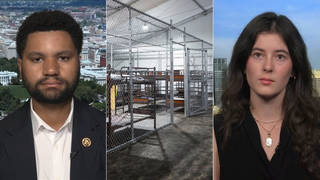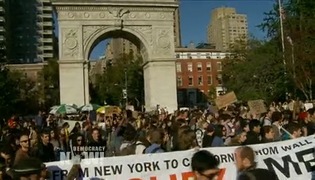
Topics
Guests
- Naomi Kleinaward-winning journalist and author. Her latest book is called The Shock Doctrine: The Rise of Disaster Capitalism.
We continue our conversation with award-winning journalist and author Naomi Klein, who came to New York to participate in and address the Occupy Wall Street encampment. Her bestselling book The Shock Doctrine: The Rise of Disaster Capitalism focuses in part on Chile, where the shock doctrine produced world-changing events after Augusto Pinochet’s coup in 1973. One of the biggest transformations of his dictatorship was to privatize education. Now, almost 40 years later, students are protesting in the streets. We speak with Klein about the student’s demands and what they feel is broken with the Chilean educational system. She also dismisses the critique that the related Occupy Wall Street protest lacks a clear set of demands. “What the demands should be to affect a system this pervasive and complex are by no means clear,” Klein says. “So it’s really about the courage to ask questions, which we don’t have the available answers for.” She adds that the Tea Party and political parties have failed to offer their own reasonable alternatives. “It’s a great irony in an economic crisis created by deregulation, privatization, corporate rule, that the solutions to the crisis become a further destruction of the public sphere and more deregulation,” Klein says.
Click to watch part one and part two of Klein’s interview with Democracy Now’s Amy Goodman and Juan Gonzalez.
AMY GOODMAN: We bring you part two of our conversation with award-winning journalist and author, Naomi Klein. She’s in New York to participate in the Occupy Wall Street encampment, will be addressing the crowds there. She’s the author of the bestselling book The Shock Doctrine: The Rise of Disaster Capitalism, which focuses on world-changing events around the world, including in Chile, where the shock doctrine is all about Pinochet’s coup in 1973 and what happened afterwards, using the theories of the economist Milton Friedman of the University of Chicago, and how a crisis was used to change an entire society. Now, almost 40 years later, students in Chile are protesting in the streets. They’ve been protesting for months. Now they’ve withdrawn from negotiations with the government and are leaving it in the hands of the people, their fate.
I talked to Naomi Klein about a number of issues, from Wall Street here to the students’ demands in Chile and what they feel is broken with the Chilean educational system.
NAOMI KLEIN: They’re saying, “We want a whole other relationship to education.” It’s going to the core of inequality, because they’re saying, “The fact that we have this profound, two-tiered education system is why Chile has become one of the most unequal societies in the world.” And, of course, that has enormous historical resonance, because this was one of the big transformations of the Pinochet dictatorship, was to privatize education and to create, out of the country in Latin America that had the largest and most vibrant middle class, the most unequal society in Latin America.
AMY GOODMAN: The origins of the privatization there, and how it relates to privatization here, of education?
NAOMI KLEIN: Well, Chile was the laboratory for what’s called the Chicago School of Economics. It was the first place in the world where the radical ideas of Milton Friedman, who believed in privatizing absolutely everything, except for the military—and his disciples went further than him and privatized that, too. These were crank ideas in the 1960s, when it was still, you know—it was still a Keynesian era, and so they weren’t able to introduce these ideas in the United States. Richard Nixon came to power. Milton Friedman thought it was going to be good for him, and Milton Friedman imposed wage and price controls and did all kinds of—and said, you know, “We’re all socialists now. We’re all Keynesians now.” And so, it was only in Chile, in the aftermath of the brutal coup and the death of Salvador Allende, that the Chicago economists had their little playground where they were able to road-test many of the policies that would eventually be globalized. And they would call that globalization. But it was never globalization; it was always the corporate takeover of the world. And that’s what’s being protested on Wall Street. So, we’re very much connected.
AMY GOODMAN: And the teachers’ unions, the significance of them there and here?
NAOMI KLEIN: The teachers’ unions—well, the teachers’ unions in Chile were—I mean, they’ve been at the forefront of organizing with their students, and there’s been a wonderful cross-generational solidarity there. And it’s just—I mean, I see—it’s so wonderful to see how inspiring it is for a new generation of activists to come up and what it does for people who have been in the struggle for so many years. And you saw that in the speeches yesterday at Occupy Wall Street, from labor leaders in all the public sectors. They’re just so grateful for this infusion of energy and enthusiasm, and there’s a great mutual respect there. And—
AMY GOODMAN: And I have to say, and a little element of shock, I could sense, from the stage, like how did this happen, them scratching their heads? They’re in their suits, and they’re saying, “We’ve been doing this for years,” and this scrappy group of folks go down to Wall Street. The union leaders are trying to get in from all over the country and the world, to come down to this rally to say, “Hey, this is our moment, too.”
NAOMI KLEIN: You know, this is the thing about social change: it just comes when you least expect it. All you can do is be ready, and it will surprise you. And that’s what’s so, I think, unfortunate about all the people who are stepping forward to offer unsolicited advice to the Occupy Wall Street protesters, all these so-called experts in activism, you know, coming forward and saying, you know, “Sit down. Don’t stand up. Don’t raise your fists. Make a peace sign. And dress nicer, and shave, wash your hair. You know, get your messaging together.” Nobody knows. It’s a surprise to us when these moments happen.
AMY GOODMAN: As one nurse said to me, who was marching, she said, “We spent so much time in the past honing this message.”
NAOMI KLEIN: Yes.
AMY GOODMAN: You know, in this corporate culture, Madison Avenue, you got to get it down to a six-second sound bite. And she said, “By then, everyone’s energy was frittered away, because everyone is arguing over, well, what exactly is the message we’re putting out?” And she said, “While the corporate media’s attacking and saying they don’t have a message, the power is that this has drawn so many people, the message that unites them all has a ripple in everyone’s lives, whether they have jobs or don’t have a job.” And one of my favorite posters there was “I lost my job and found an occupation.”
NAOMI KLEIN: Yeah. You know, this thing, you know—
AMY GOODMAN: Or, “This is not a recession. This is a robbery.”
NAOMI KLEIN: That’s right. That was my favorite. That was my favorite. I took a picture of that on my phone. No, this line, you know, “What’s your demand? What’s your message?” If it wasn’t that, it would be something else, right? I mean, let’s not get hung up on it. During the anti-corporate protests that began—you know, came to world attention in Seattle in 1999, it was “What’s your alternative?” Because our demand was really clear: we wanted to shut down the WTO, we wanted to shut down the IMF. Our demands were very clear, so it was, “Well, what do you want instead?” And there’s always going to be one of these memes out there that is just really about delegitimizing dissent, and we shouldn’t get hung up on it.
And I think it’s good that—you know, Nick Kristof wrote this absurd column telling the protesters what their demands should be, and they are these extremely sort of wonky—good ideas about how to reform the financial sector, but the problem is, is that I think they’re too small. And you don’t know how big you can dream until you know how big your movement is. And so, that’s why I think the Chilean students, you know, they’ve got a big demand, and that demand has been enormously galvanizing of one big, clear demand. For a movement like this, that is really going after a system—you know, this is the people who have learned the lesson of pinning all their hopes on the Democratic Party, thinking that they could just change the person in power, that that would fix things. So now they’re going after a system, and what the demands should be to affect a system this pervasive and complex are by no means clear. We don’t know what it is. So it’s really about the courage to ask questions, which we don’t have the available answers for, which is something that Wes Jackson, a wonderful, wonderful poet of farming, who runs the Land Institute in Kansas, says, that we have to have the courage to ask questions for which we don’t have the available answers. And that’s what that wonderful open space in Liberty Plaza represents to me, that people are asking those questions and giving themselves the space to dream big.
AMY GOODMAN: We’re speaking on the 10th anniversary of the invasion of Afghanistan today, major marches planned for Washington, D.C. How does war fit into this story? There was another poster. Someone said, you know, “It is very simple to fix the deficit: end the wars, tax the rich.”
NAOMI KLEIN: Tax the rich, end the war, yeah, yeah, yeah. Well, that’s one place it fits in. I mean, we were talking about this last night with a group of us, including Jeremy Scahill and Richard Rowley, who you’ve just been working with a lot, and that’s the message, that we know where the money is. And Michael Moore said it, as well. You know, America is not broke; it has a redistribution crisis. And so, we know where the money is bottlenecked: it’s bottlenecked at the Pentagon, and it’s bottlenecked on Wall Street. And this is where the sites of protest has to follow where the money is. It’s what any good journalists do. It’s what any good investigator does, follow the money.
That said, you know, I don’t think that the position should be, you know, “stop the wars because they’re too expensive.” You know, I think that’s a morally bankrupt position. So we can’t simply be—it can’t simply be a financial issue; it’s a moral issue, as well. There are many, many reasons we should stop these wars, but it is absolutely connected to the financial crisis, as well.
That said, I always worry a little bit when, in the U.S. discourse, it becomes, you know, “Why are we helping to rebuild Iraq, when we should be rebuilding America?” And the fact is, these are illegal wars. They’re wars that the United States owes reparations for. So the idea of just walking away and keeping the money, it’s not that simple, and I think we should always remember that. So, there’s enormous amounts of money that can be moved from the Pentagon budget to education, to healthcare, but that doesn’t sever the responsibility that the U.S. owes financially to countries that it has helped to destroy.
AMY GOODMAN: Why don’t we conclude, Naomi, with you just describing this moment for us. I mean, you were in Canada. You came down to the protest in Washington—
NAOMI KLEIN: Yeah.
AMY GOODMAN: —very much involved with climate change. You’re writing a book on climate change.
NAOMI KLEIN: Yeah.
AMY GOODMAN: And Occupy Wall Street happened, so you’re here.
NAOMI KLEIN: Look, I spent a long time studying and writing about how elites use times of economic crisis to push through radical restructurings of societies in the interests of elite. And it’s a great irony in an economic crisis created by deregulation, privatization, corporate rule, that the solutions to the crisis become a further destruction of the public sphere and more deregulation. And this is what, you know, we hear from the Tea Party right. They want to get rid of any regulation whatsoever. So, I’ve always said that the only way you can resist the shock doctrine is to know that it’s happening while it’s happening, and that there has to be a tremendous pushback. And we’ve seen that in Europe. We’ve seen that it can, in many ways, slow the cuts, if not stop them completely. And the whole world’s been waiting for the United States to realize this and join this global struggle.
I think that because this country is so focused on electoral politics, in every two years, all of the energy that is the antiwar movement or is the climate movement, or whatever the issue-based movement is, suddenly changes its attention to, “Let’s try to get the Democrats elected.” Just has an incredibly corrosive impact on the ability to build lasting, sustainable movements. And I feel like that’s what people are realizing now, that if want to—if you care about these issues, build movements focused on those issues, and let the Democrats worry about themselves.
AMY GOODMAN: Naomi Klein, I want to thank you for being with us.












Media Options